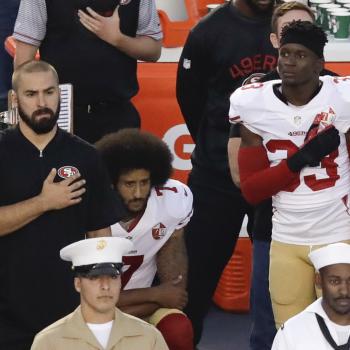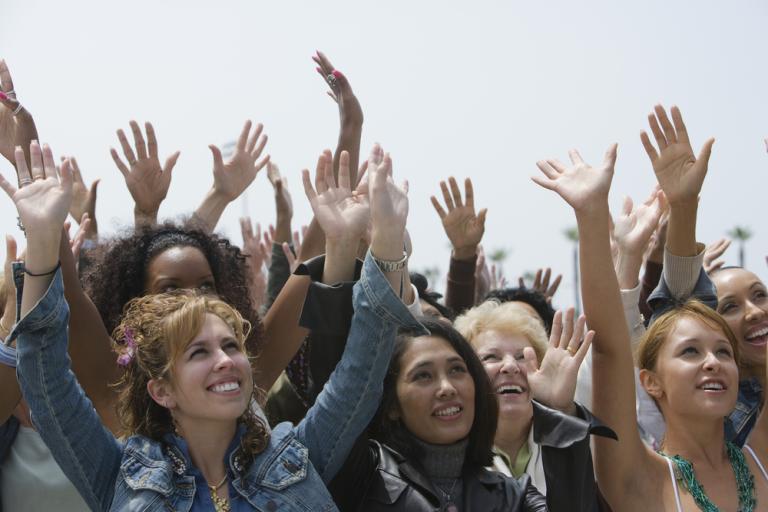By Shalom Goldman, Duke University
Earlier this month the pop star Madonna, accompanied by her ex-husband film director Guy Ritchie, celebrated her son Rocco’s Bar Mitzvah at the Kabbalah center in NYC.
That neither parent, nor their 13-year-old son, was Jewish, didn’t disturb the celebrity journalists and paparazzi who covered the story, and the fact was not made much of in US Weekly, the celebrity magazine that broke the story. Within Israel, where Madonna is a frequent visitor, the Bar Mitzvah story made a small splash: Madonna has legions of fans in that country, the great majority of whom are very flattered by the attentions of a pop diva. But they could not care less about her dabbling in Jewish mystical practices.
Organizing a Bar Mitzvah ceremony (reports are that Rocco read from the Torah and chanted some prayers) is, however, more than dabbling. And one could say the same about conducting a Passover Seder or enacting a Jewish wedding ceremony—complete with a wedding canopy and a broken glass. For these Jewish rituals, and others, are now frequently performed by American Christians of varied denominations in churches, interfaith chapels, and wedding halls. Church members with whom I have discussed these rituals have told me that as Christians they feel that these ceremonies strike them as “biblical” and “authentic.” (I don’t have the heart to tell them that neither wedding ceremonies, seders, or Bar Mitzvahs are recorded in the Hebrew Bible.)
Thus a type of “Judaism”—in the sense of ritual practice—has found a home among those who are not Jewish. And we can now speak of “Judaism without Jewishness”: a situation in which the content is from the Jewish tradition, but the actors are not.
In parallel, there is a strong trend toward “Jewishness without Judaism”—a scenario in which the actors are ethnically Jewish, but the content has little or nothing to do with the tradition. For Jewishness in the United States is most often expressed in ways that have no connection to religious ritual or law. In the same week that Madonna and family celebrated Rocco’s Bar Mitzvah, the Forward, New York’s venerable Jewish weekly newspaper, ran an article on a group of Jews who “changed Judaism forever.” Expecting to read about Maimonides, Moses Mendelssohn, and the Lubavitcher Rebbe, I was startled to see that the article was about Bob Dylan, Barbra Streisand, Sandy Koufax, and Lenny Bruce. And the “Judaism” that the article referred to was the way Jews are perceived by other Americans, and by extension, the way they perceive themselves. As a child of the Sixties, I too am proud of Bob Dylan, et al.—but what does that have to do with Judaism?
In today’s cultural and religious marketplaces, religion and ethnic solidarity are often confused. While one can forgive a newspaper headline writer’s wish to enshrine Lenny Bruce as a hero of “Judaism” (one can imagine that Lenny Bruce, whose given name was Leonard Alfred Schneider, would have had a lot of fun with this designation), it is harder to understand the Jewishness and Judaism constantly referred to in a recent book published by Yale University Press.
Distant Intimacy: A Friendship in the Age of the Internet, records the email correspondence between English novelist and screenwriter Frederic Raphael and American essayist Joseph Epstein. Making a “book” out of the emails of two writers, witty as they may be, seems like a strange project for a prestigious academic publisher such as Yale. But most striking for this observer of American religion is that Raphael and Epstein are constantly referring to their Jewish identity. But this is an identity devoid of all content. Like the Forward’s “Jews who changed Judaism,” their interest is in the way Jews are perceived by others, and more specifically it is about uncovering any hint of antisemitism. Neither of these erudite authors (each of whom has authored over twenty books) expressed any interest in Jewish texts, languages, or rituals. Jewishness for them is ferreting out potential or actual antisemites. This all-too-common type of “Jewishness” has as its hallmark a lack of real content.
In its place we get a reactive defensiveness and a marked hostility to all organized religion, most pointedly to Islam. In a discussion of politics, Frederic Raphael writes to Joseph Epstein that “Islam is a parody of Judaism, and so, in many forms, is Judaism.”
As Lenny Bruce might have said: “If this is Judaism, give me vanilla.”












